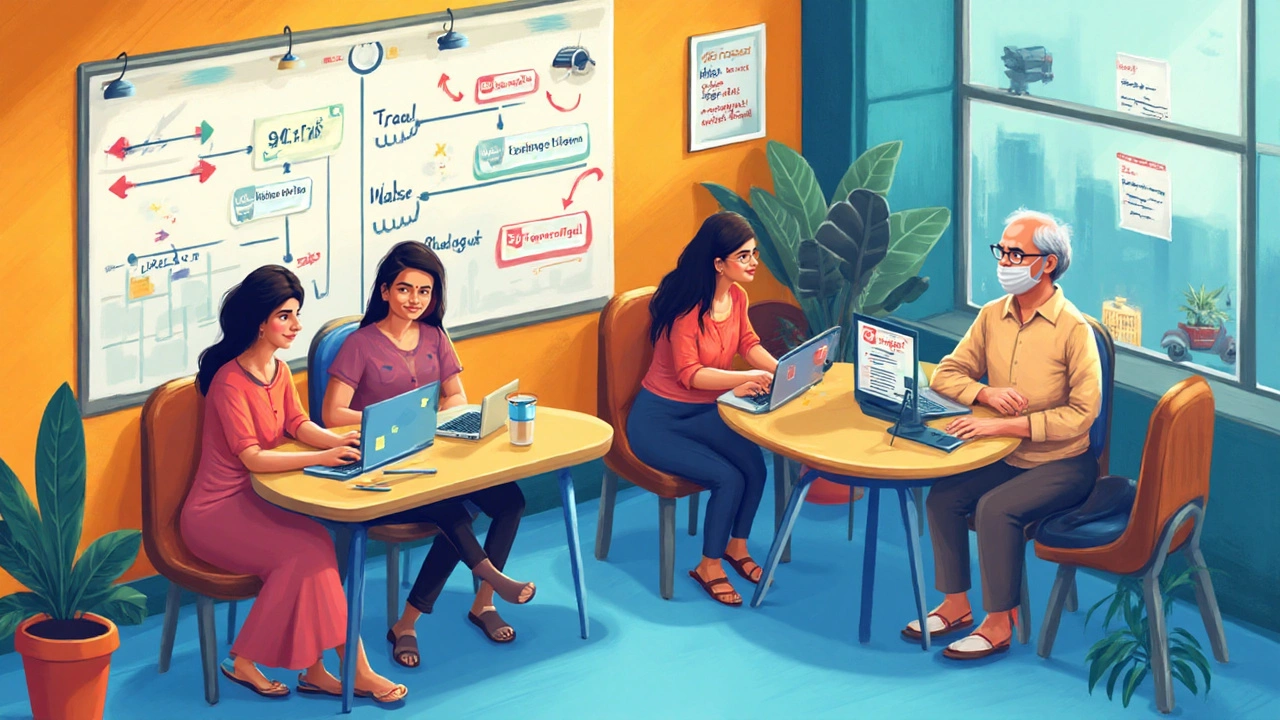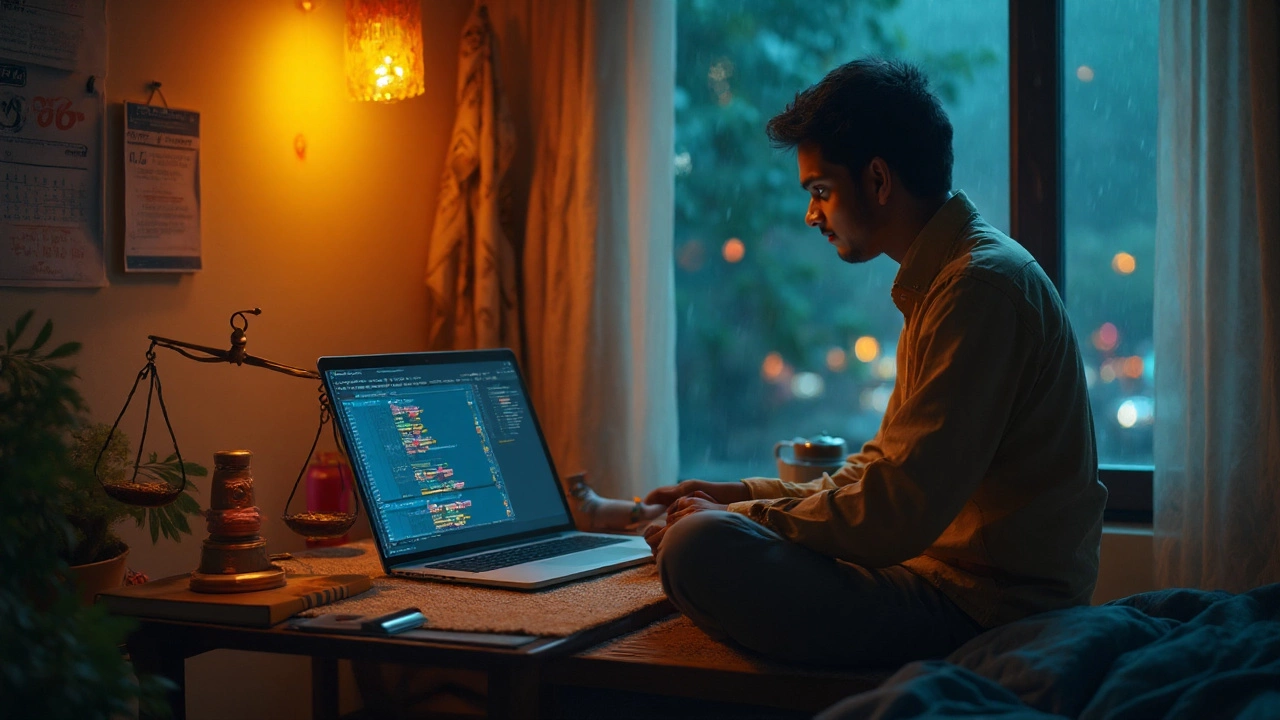You clicked this because you want a straight answer, not a shopping list. Here it is: there isn’t one magic platform for every beginner. Your best choice depends on your goal (web, data, games, kids), your device (phone, Chromebook, old laptop), and how you like to learn (guided lessons or build-first). I’ll show you the few picks that work for most people, when to pick each one, the quirks that trip newbies, and a simple first‑month plan. I write this from Bristol with Simba the cat trying to sit on my keyboard-so if you’re juggling real life too, this guide is on your side.
- TL;DR
- If you want a free, job‑relevant path for web dev: freeCodeCamp. Zero cost, real projects, tough love.
- If you want guided, interactive lessons with checkpoints: Codecademy Pro or Scrimba Pro. Clear structure, paid tiers.
- For kids or absolute first steps: Scratch or Code.org. Visual blocks, instant wins.
- For coding in the browser with minimal setup: Replit. Great for tinkering and sharing.
- For Python and data basics: freeCodeCamp Python path + Python Tutor for visual debugging; add Coursera if you want a certificate.
How to choose your first coding platform in 2025
Most people asking “Which is the best coding platform for beginners?” really mean, “Which one lets me start fast, stick with it, and actually ship something?” So use this quick filter.
Your goal drives the pick:
- Web career path (sites, apps, junior dev jobs) → Start with freeCodeCamp or The Odin Project; add Replit or VS Code when you’re ready.
- Data and Python basics (automation, analysis, AI later) → freeCodeCamp Python path; pair with Python Tutor; take a Coursera Specialization if you want a certificate.
- Kids 8-12, or adults who need a no‑stress start → Scratch or Code.org; move to JavaScript or Python in 2-4 weeks.
- Fast interactive lessons and structure → Codecademy Pro or Scrimba Pro; switch to projects by week 3.
- Only a tablet/phone or school Chromebook → Replit, Code.org, Grasshopper, Scratch.
Decision criteria that matter:
- Friction: Can you code in the browser with no installs? Beginners stick when they can start in 5 minutes.
- Feedback speed: You should type, run, and see a result in under 10 seconds. That loop keeps motivation alive.
- Real skills vs. toys: Blocks (Scratch) are perfect to start, but switch to JavaScript or Python by week 2-4 for long‑term progress.
- Pedagogy: Lessons → practice → project → reflection. Platforms that hit all four help you actually learn.
- Community: Forums, Discords, and peer reviews matter when you get stuck. Check if the platform has an active place to ask questions.
- Cost: Keep it low until you’ve built two small projects. Free resources today are genuinely good.
- Certificates: Nice on LinkedIn, not magic. Projects and a GitHub profile speak louder for junior roles.
Quick heuristics:
- 5‑minute rule: If you’re not writing and running code within 5 minutes of signing up, pick another platform.
- 30/30 rule: Do 30 minutes per day for 30 days. Momentum beats weekend marathons.
- Project‑first by week 2: Build a tiny thing (a quote generator, a to‑do app, a data plot). Tutorials alone stall.
- One language to start: JavaScript for web; Python for data/automation. Don’t mix both in month one unless you’re patient.
- Use what top devs use: The Stack Overflow 2024 survey showed JavaScript and Python leading usage, and GitHub’s 2024 Octoverse tracked strong growth in TypeScript and Python. That’s a good signal for employability.
Simple decision tree (text version):
- Are you learning for a job in web dev within a year?
- Yes → freeCodeCamp → add Replit → switch to local dev (VS Code) by month 2.
- No/unsure → Do you want structured lessons? → Codecademy or Scrimba → then projects on Replit.
- Is this for a child or total beginner afraid of syntax?
- Yes → Scratch or Code.org → then JavaScript after 10-14 days.
- Only have a tablet/phone/Chromebook?
- Yes → Replit + Code.org/Grasshopper → later add freeCodeCamp in browser.
- Want Python for data/automation?
- Yes → freeCodeCamp Python → Python Tutor → optional Coursera certificate.
Common pitfalls (and fixes):
- Tutorial hell: If you’ve done more than two beginner courses and still haven’t built something, stop and build a tiny app today.
- Jumping platforms: Pick one main platform and one sandbox (e.g., freeCodeCamp + Replit). Switching every week kills progress.
- Overpaying early: Don’t lock into pricey subscriptions or bootcamps before you’ve coded 20 hours.
- Math anxiety: Web and basic Python don’t require heavy math at the start. You can ramp up later.
- Old laptop woes: Use browser‑first tools (Replit, Scratch, Code.org). Avoid big installs until month 2.
Pro tips: Keep a “success log” of what you built today (one line). Ask one question a day in a forum. Use spaced repetition for syntax you keep forgetting. I keep a sticky note with three commands I mess up, right beside Simba’s food bowl-hard to miss.

Top beginner platforms compared (2025)
I’m keeping this list tight. These are the platforms I’d recommend to a friend who wants to see results in a month.
freeCodeCamp (web, Python, data): 100% free, browser‑based lessons and projects, active forum. Great for building real projects and earning free certifications. The challenge‑driven style can feel blunt but it makes you learn.
Best for: Self‑starters, budget learners, web career path. Not for: People who need lots of hand‑holding or flashy UI.
Codecademy (multiple languages): Interactive lessons with instant feedback and quizzes; Pro unlocks projects and paths. Clean structure and progression.
Best for: Learners who like guided checkpoints. Not for: Those avoiding subscriptions or who prefer building from day 1.
Scrimba (web dev): Unique “scrim” videos you can pause and edit in the player. Solid JavaScript and React tracks. Feels hands‑on from lesson one.
Best for: Visual learners who want to code inside the lesson. Not for: People who prefer reading or textbooks.
Replit (cloud coding): In‑browser IDE for dozens of languages. Great for sharing projects, collaborating, and avoiding setup headaches.
Best for: Chromebooks, tablets, quick prototypes, pair‑programming. Not for: Heavy local dev or larger professional projects.
Scratch (MIT, blocks): Designed for kids and absolute beginners. Teaches logic and problem‑solving with instant visual feedback.
Best for: Ages 8-12 or adults who fear syntax. Not for: Anyone who wants job‑ready skills right away.
Code.org (K‑12): Classroom‑friendly, structured units. Great for young learners and schools. Works well on low‑end devices.
Best for: Teachers, kids, Chromebooks. Not for: Career switchers who want deeper projects fast.
Khan Academy (JS, drawing/animation): Fun JavaScript and processing‑style lessons; friendly for teens and hobbyists.
Best for: Fun projects, visual learners. Not for: A full career path.
The Odin Project (web): Free, project‑heavy path using real tools (HTML/CSS/JS, Node, Ruby). Tough but thorough.
Best for: Gritty learners who want a portfolio. Not for: True day‑one beginners without any patience for setup.
Coursera (university/industry courses): Certificates from known brands. Good for Python/data foundations and credibility on LinkedIn.
Best for: Those who want a certificate and structured syllabus. Not for: Folks who won’t finish long courses.
| Platform | Best for | Languages/Focus | Setup | Typical 2025 price | Certificates | Device support |
|---|---|---|---|---|---|---|
| freeCodeCamp | Web path, projects | HTML/CSS/JS, Python, Data | Browser | Free | Yes (free) | PC/Mac/Chromebook, tablet |
| Codecademy | Guided lessons | JS, Python, SQL, more | Browser | Free basic; Pro ~ $17-$39/mo (£15-£30) | Yes (Pro) | PC/Mac/Chromebook, tablet |
| Scrimba | Interactive video coding | Web (JS, React, CSS) | Browser | Free samples; Pro ~ $18-$30/mo | Course certificates | PC/Mac/Chromebook |
| Replit | Browser coding & sharing | Many (JS, Python, etc.) | Browser | Free; Core ~ $20/mo (£16-£20) | No formal course certs | PC/Mac/Chromebook, tablet, phone |
| Scratch | Kids/first steps | Block‑based | Browser | Free | No | PC/Mac/Chromebook, tablet |
| Code.org | School use, beginners | Blocks → JS | Browser | Free | No | PC/Mac/Chromebook, tablet |
| Khan Academy | Fun JS & art | JS/Processing, math | Browser | Free | Course completions | PC/Mac/Chromebook |
| The Odin Project | Serious web portfolio | JS/Node, Ruby | Browser + local tools | Free | Course completion | PC/Mac (Chromebook possible) |
| Coursera | Certificates, Python/data | Python, SQL, CS basics | Browser | Free audit; Paths ~ $39/mo (£31) | Yes (university/industry) | PC/Mac/Chromebook |
Who should pick what (fast guide):
- Career switcher to web dev: freeCodeCamp → Replit → VS Code → The Odin Project for deeper projects.
- Teen or absolute beginner: Scratch for 10-14 days → Code.org’s JS intro → freeCodeCamp HTML/CSS.
- Python and data curious: freeCodeCamp Python → Python Tutor for step‑through → Coursera for certificate.
- Only a phone/tablet: Grasshopper (JS), Replit, Code.org. Keep lessons short and frequent.
- Hate subscriptions: freeCodeCamp + The Odin Project + YouTube playlists; donations optional.
Key trade‑offs: free vs. structure. Free paths demand more self‑management. Paid paths give you checkpoints and reminders. Another trade‑off: blocks vs. real code. Blocks are friendly but you need to switch to text within a month if you’re aiming at real projects. Browser‑only tools are fast to start; local tools are what pros use. Start in the browser, then move locally when you need speed and control.
Credible alternatives you might like: Microsoft MakeCode (great with micro:bit and Minecraft Education), MIT App Inventor (build simple Android apps), PyCharm Edu or Thonny (gentle Python IDEs), and Python Tutor (visualize code line‑by‑line). These pair well with the main platforms above.

Your 30‑day plan, FAQs, and troubleshooting
Use this simple plan to avoid the two biggest beginner killers: choice overload and tutorial binging without building.
Week 0: pick your stack in 10 minutes
- Web career path → freeCodeCamp Responsive Web Design + Replit account.
- Python/data → freeCodeCamp Python section + bookmark Python Tutor.
- Kids/absolute beginners → Scratch + pick 3 fun projects (maze, sprite animation, clicker game).
- Guided lessons → Codecademy or Scrimba 7‑day trial/first month; set a cancel reminder.
Week 1: start, don’t optimize
- Daily 30 minutes, same time each day. Turn off phone notifications.
- Browser‑first only. No installs yet. Replit for experiments.
- Write a tiny “today I built…” log (one line). Momentum matters.
Week 2: build your first tiny project
- Web: a 3‑page personal site with nav and a contact form (mock).
- Python: a command‑line to‑do app or a CSV summarizer (sum, mean).
- Scratch: a clicker game with score and levels.
- Share it (friend, forum). Ask for one piece of feedback.
Week 3: add one new concept
- Web: forms, responsive layout, or fetch an API (public quotes).
- Python: functions and error handling; read a JSON file.
- Scratch: variables and simple state (lives, levels).
- Keep sessions to 45 minutes tops; end with a question for tomorrow.
Week 4: polish and publish
- Put code on GitHub (learn the basics: init, commit, push) or host on Replit.
- Write a 200‑word README: what it does, how you built it, what you learned.
- Review your month: What was hard? What was fun? Plan month two.
Beginner checklist
- Chrome or Edge updated; dark mode on to reduce eye strain.
- Free accounts: freeCodeCamp, Replit, GitHub (optional week 4).
- Keyboard shortcuts: Ctrl/Cmd + S (save), Ctrl/Cmd + / (toggle comment), Ctrl/Cmd + F (find).
- Ask for help with this template: “What I tried → what I expected → what I saw → code snippet.”
Mini‑FAQ
- Which language should I start with? JavaScript for web; Python for data/automation. Both are popular and beginner‑friendly.
- How long to get comfortable? Around 60-100 hours to build small projects without hand‑holding. Spread that over 2-3 months.
- Can I learn on an iPad or Chromebook? Yes. Use Replit, Code.org, Scratch, and freeCodeCamp. Avoid big local installs.
- Do certificates matter? They help on LinkedIn and show commitment. For jobs, projects + GitHub matter more.
- Am I too old to start? No. I’ve seen people in their 40s and 50s ship projects and get work. Consistency beats age.
- Will I need math? Not at the start. Logic, loops, and problem‑solving first; math comes later for data science or algorithms.
- How do I avoid tutorial hell? Limit yourself to 2 weeks of lessons before your first tiny project. Ship something-even if it’s ugly.
Troubleshooting
- “I keep getting errors.” Read the first error line. Copy a minimal code snippet into Replit and isolate the failing part. Use Python Tutor for Python logic bugs.
- “I’m bored.” Switch context: build something you care about-a football fixtures page, a pet feeding log (yes, I built one for Simba), or a budget tracker.
- “My laptop is slow.” Browser‑only tools. Keep only one tab open while coding. Avoid video streams during practice.
- “I missed three days.” Do a 15‑minute reset session today. Don’t try to “catch up” in one go.
- “School/work blocks installs.” Use Replit or Code.org. They work behind most filters.
- “I can’t decide between platforms.” Flip a coin between freeCodeCamp and Codecademy. The real win is showing up daily.
What about AI tools? Use them as a coach, not a crutch. Ask for explanations, not full solutions at first. Compare your code to an AI‑suggested version to learn patterns. Keep your own thinking active-jobs reward problem‑solvers, not copy‑paste.
When to switch platforms
- After 2-4 weeks if you dread opening the app. Try one alternative that fits your goal.
- If your platform can’t do the project you want (e.g., Scratch to web app) → move to JavaScript or Python.
- Once you finish a path and need deeper practice → add The Odin Project or local dev tools.
Your next steps (pick one and start today)
- Create a freeCodeCamp account and finish the first five HTML challenges, or
- Start Codecademy’s free intro and build a tiny Replit app alongside, or
- Make a Scratch clicker game and share it with one friend/child.
If you’re still unsure, here’s my short answer: freeCodeCamp for the no‑nonsense, free route to real skills; Codecademy or Scrimba if you need structure; Scratch or Code.org for kids; Replit to code anywhere. Start simple. Build small. Keep going. That’s how beginners become developers.
